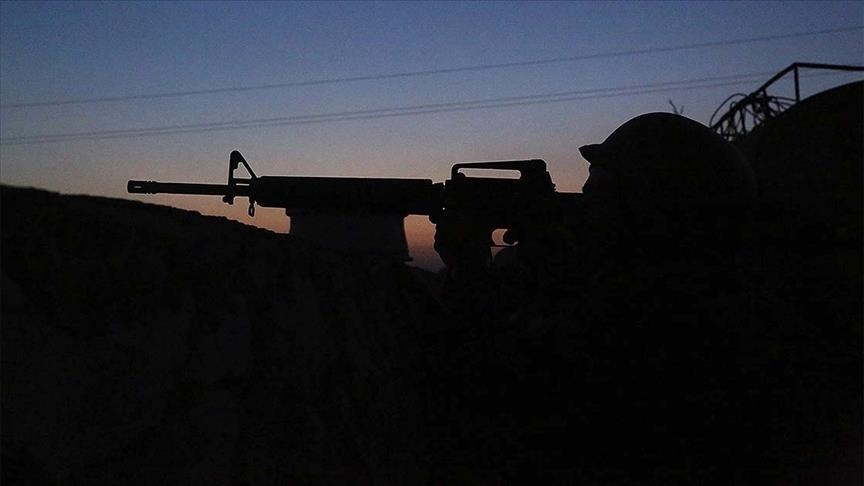Yemen: 'Militarizing women impacts social cohesion'
Experts say recruitment of women by warring parties as combatants and spies has consequences for Yemeni society

ISTANBUL
Earlier this month, authorities in the northeastern Marib province of war-ravaged Yemen claimed having busted a spy cell by arresting eight women.
They have been accused of working for the Iran-backed Houthi rebels, who currently control the capital Sanaa and a large part of northern Yemen.
On the other side, three civil rights groups recently documented the case of Asma al-Omaisi, 22, a mother of two children, sentenced to death by Houthi rebels. They have also accused her of spying for government forces.
Speaking to Anadolu Agency, Kawkab Althaibani, director of an NGO, Women for Yemen Network, described it as a new phenomenon, where women are allegedly recruited to work in intelligence networks.
A former prison inmate, Fawzia al-Mahwiti, said that Houthi rebels had forced her to spy on fellow prisoners.
She was earlier working as a prison official, but she submitted a resignation protesting against the treatment of women by Houthis when they took over Sanaa.
But they imprisoned her and asked her to snoop on prisoners as a condition to accept her resignation.
“I was threatened. They lodged me with prisoners for three weeks and asked me to spy on them. They threatened to harm my children. When I was released, they asked me to train other female guards before they accept my resignation,” she added.
“Six days later after my release, they sent some military personnel to arrest me again. But with the help of colleagues, I managed to escape with kids to Aden. Since then I have not returned to Sanaa,” she said.
A report by the UN Group of Eminent International and Regional Experts on Yemen last September found children being recruited by the warring armed groups.
The report cited that 34 girls aged 13-17 were recruited by the Houthi rebels in five years from 2015-2020 to work as spies, guards, medics, and members of the Zainabiyat -- a women's military group established by Houthis.
Government forces recruit women
“Girls from Houthi-affiliated or socio-economically disadvantaged families, or those in detention, were especially targeted for recruitment. As many as 12 girls allegedly survived sexual violence or were forced to marry, which was also directly linked to their recruitment,” said the report.
The Panel of Experts on Yemen in their report to the UN Security Council in January 2020 also documented multiple violations perpetrated by Zainabiyat that included arbitrary arrest and detention of women, sexual assault, beatings, torture, and facilitating rape in secret detention centers.
Media reports suggested that in Taiz, a city in southwestern Yemen, the groups aligned to government forces have also recruited women. Besides being used to undertake medical and relief work, they are also asked to carry out raids on suspected houses.
Speaking to Anadolu Agency, Hooria Mashhour, a former minister of human rights, said while she favors women taking over the highest positions in the Defense Ministry, using them as combatants should be completely rejected.
“This is because they are going to be used to arrest, detain, imprison and torture other women,“ she said.
In October 2015, Taiz witnessed a graduation ceremony of the first batch of female police officers where they demonstrated some of their combat skills.
Another batch of 86 female soldiers joined the 35th Armored Brigade under the name of the Hope Batch.
Althaibani said while the involvement of women in any armed groups is problematic, but the situation in Taiz was a reaction unlike in the north where rebels are systematically using women.
Zainabiyat military parade shock for Yemenis
Three years ago, media displayed pictures of Zainabiyat female forces participating in a military parade in Sanaa, carrying machine guns and Kalashnikovs.
Observers said that the scenes angered the conservative Yemeni people, who used to keep women away from any politically driven conflicts or anything that is associated with violence or causes harm and danger.
“Houthis use women as a tactic to appeal to social norms. So, many people would not disagree with this act because Houthis always claim that this act comes in respect to society and its tradition as female security groups are formed to protect other women,” Althaibani said.
She said that the militarization of women has impacted social cohesion in Yemen.
“Families within the same neighborhood feel insecure when female militants live in the same neighborhood. This will install further fear among people and social cohesion is going to get more destroyed,” she said.
Mashhour said this phenomenon needs to be addressed once the war ends. She called for the demobilization and rehabilitation of female soldiers.
But many observers say that it is the lure of salary and perks as well since the warning parties prioritize paying to combatants rather than using the money for public services.
However, Tawfiq al-Humeidi, head of SAM Organization for Rights and Liberties, said that the issue was not connected to the economic situation. He blamed Houthis for militarizing the society by raising Zainabiyat's force. Describing recruitment of girls as combatants as a negative sign of the war, he said action further contributed to the violations of human rights, especially attacks against women.
Anadolu Agency website contains only a portion of the news stories offered to subscribers in the AA News Broadcasting System (HAS), and in summarized form. Please contact us for subscription options.



